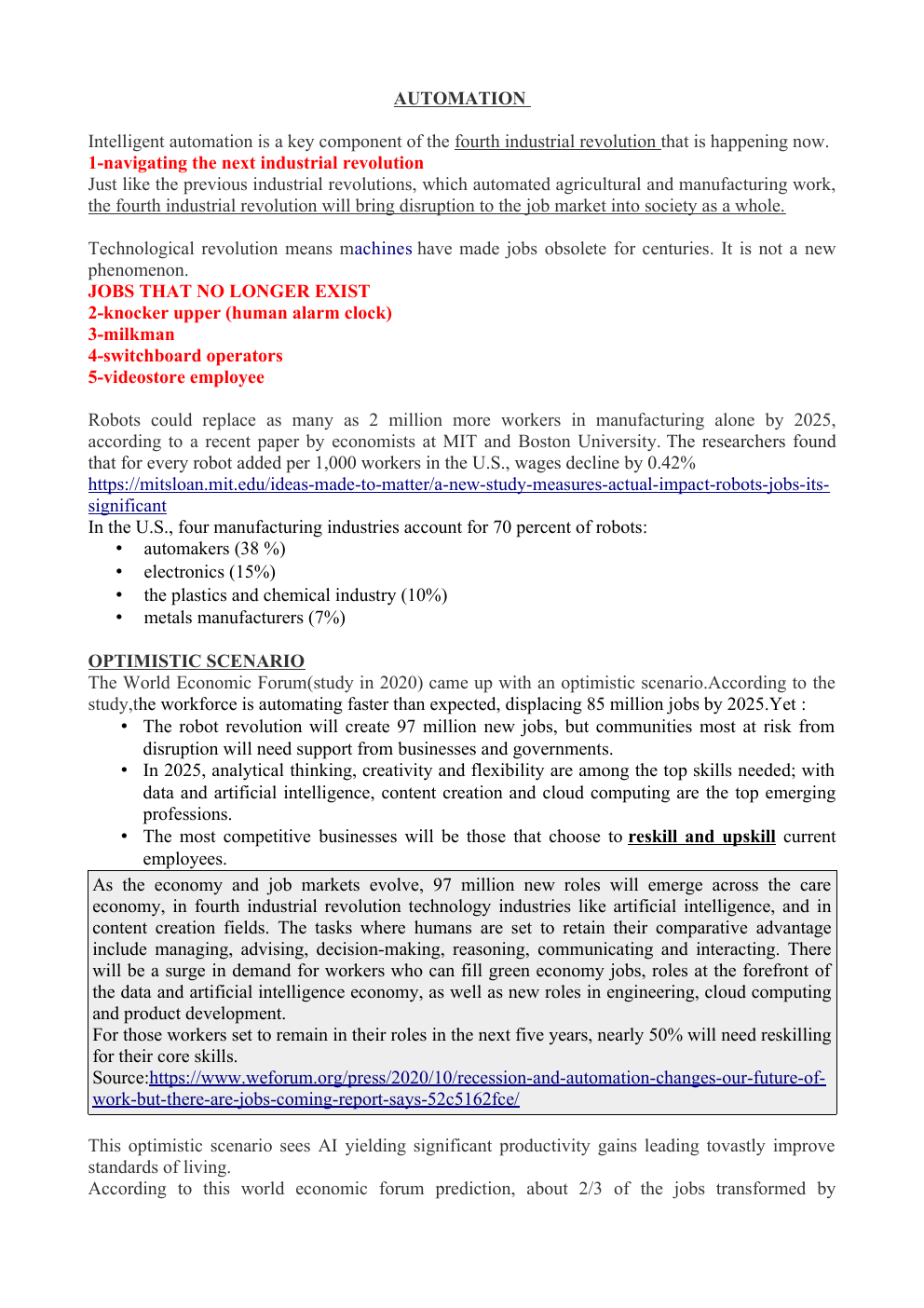automation
Publié le 09/07/2023
Extrait du document
«
AUTOMATION
Intelligent automation is a key component of the fourth industrial revolution that is happening now.
1-navigating the next industrial revolution
Just like the previous industrial revolutions, which automated agricultural and manufacturing work,
the fourth industrial revolution will bring disruption to the job market into society as a whole.
Technological revolution means machines have made jobs obsolete for centuries.
It is not a new
phenomenon.
JOBS THAT NO LONGER EXIST
2-knocker upper (human alarm clock)
3-milkman
4-switchboard operators
5-videostore employee
Robots could replace as many as 2 million more workers in manufacturing alone by 2025,
according to a recent paper by economists at MIT and Boston University.
The researchers found
that for every robot added per 1,000 workers in the U.S., wages decline by 0.42%
https://mitsloan.mit.edu/ideas-made-to-matter/a-new-study-measures-actual-impact-robots-jobs-itssignificant
In the U.S., four manufacturing industries account for 70 percent of robots:
• automakers (38 %)
• electronics (15%)
• the plastics and chemical industry (10%)
• metals manufacturers (7%)
OPTIMISTIC SCENARIO
The World Economic Forum(study in 2020) came up with an optimistic scenario.According to the
study,the workforce is automating faster than expected, displacing 85 million jobs by 2025.Yet :
• The robot revolution will create 97 million new jobs, but communities most at risk from
disruption will need support from businesses and governments.
• In 2025, analytical thinking, creativity and flexibility are among the top skills needed; with
data and artificial intelligence, content creation and cloud computing are the top emerging
professions.
• The most competitive businesses will be those that choose to reskill and upskill current
employees.
As the economy and job markets evolve, 97 million new roles will emerge across the care
economy, in fourth industrial revolution technology industries like artificial intelligence, and in
content creation fields.
The tasks where humans are set to retain their comparative advantage
include managing, advising, decision-making, reasoning, communicating and interacting.
There
will be a surge in demand for workers who can fill green economy jobs, roles at the forefront of
the data and artificial intelligence economy, as well as new roles in engineering, cloud computing
and product development.
For those workers set to remain in their roles in the next five years, nearly 50% will need reskilling
for their core skills.
Source:https://www.weforum.org/press/2020/10/recession-and-automation-changes-our-future-ofwork-but-there-are-jobs-coming-report-says-52c5162fce/
This optimistic scenario sees AI yielding significant productivity gains leading tovastly improve
standards of living.
According to this world economic forum prediction, about 2/3 of the jobs transformed by
automation will become higher skilled, while the other third will be lower skilled.
In addition to the kind of jobs that people will have and the place that AI will take on the job market
the question of wages is very important.
On the one hand, bots can boost wages.
Obviously, wages are dictated by supply and demand.
When jobs require specialised skills, wages rise.
They also rise when workers are scarce because
there are fewer people available to supply the labour.
It explains why pilots and more than plumbers
chemists more than cashiers.
For example Alan Krueger hinted at automations wage boosting
abilities.He found that computer-savvy workers had wage premiums of 10 to 15% more than
computer-illiterate counterparts.
Check into a hotel today, and a mechanical butler designed by robotics company 6-Savioke delivers
towels and toothbrushes.
(“No tip required,” Savioke notes on its website.)
That doesn’t mean they’re....
»
↓↓↓ APERÇU DU DOCUMENT ↓↓↓
Liens utiles
- TECHNOLOGIE DE L'AUTOMATION Les techniques fondamentales des procédures d'automation, les méthodologies
- Automation.
- Définition: AUTOMATION, substantif féminin.
- Automation et rentabilité
- L'automation est-elle un remède à la division du travail ?







